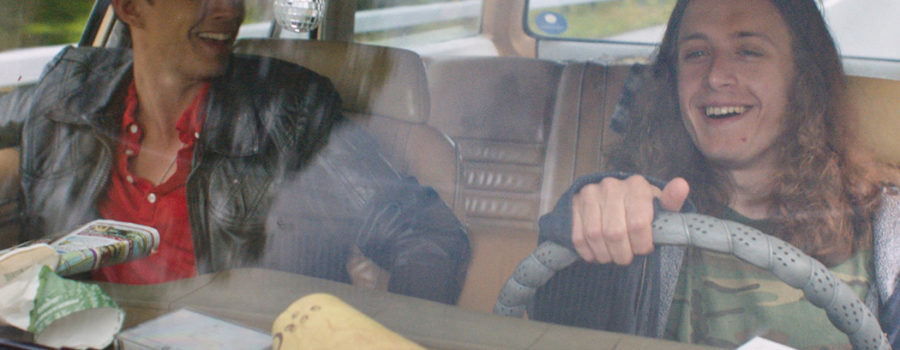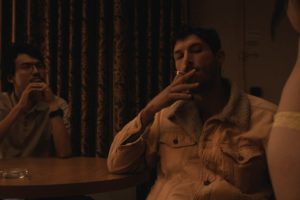[Originally published at Film Inquiry] Rory Culkin is the youngest of eight children, and one of three famous Culkin brothers, the others being Kieran, who can currently be seen on HBO’s hit show Succession, and Macaulay, one of the most iconic child stars in the history of cinema. Rory has made a name for himself, having successfully made the transition from child actor into adult actor, no small feat. Culkin first appeared alongside Laura Linney, Matthew Broderick, and Mark Ruffalo in Kenneth Lonergan‘s You Can Count On Me in 2000. Since then, he has starred in popular films such as Signs, Mean Creek, Lymelife, and Scream 4. His latest film, The Song Of Sway Lake, releases simultaneously with his new show, Castle Rock. It’s been a good year for Culkin.
Written by Elizabeth Bull and Ari Gold and directed by Gold, The Song Of Sway Lakeis about an upper class jazz vinyl collector who enlists the help of his only friend, a Russian drifter (Robert Sheehan), to help him steal a 78 record from his family’s estate. It’s part buddy comedy, part family bonding film, part treasure hunt quest, and every frame is infused with cosmic amounts of nostalgia.
Recently, I had chance to catch up with Culkin and discuss The Song of Sway Lake, what drew him to the subject matter, his, at times, rocky relationship with director Gold, his chemistry with Sheehan and Mary Beth Peil, his film career, and much more!

Alex Arabian of Film Inquiry: I recently interviewed your brother, Kieran, for his show, Succession. Small world.
Rory Culkin: Ah, awesome show.
Yeah. It’s a good one. I thoroughly enjoyed your film, The Song of Sway Lake. Congrats, man.
Rory Culkin: Thanks, man.
Absolutely. What initially drew you to Elizabeth Bull and Ari Gold’s script?
Rory Culkin: The idea of being a young collector of records at the time when it wasn’t particularly cool or sexy to do and, yeah, just the way it was written. It just almost felt like a treasure hunter [story], in a way.
Yeah. I certainly liked that aspect of it. What can you say about Gold as a director? What is his process?
Rory Culkin: It’s been a while actually since we shot it. He’s been working on it for a long time, and for the past few years, I’d see him every once in a while just to insert a line here and there. But he’s had a particular vision that he wanted to stick to. I always think it’s strange when I see an interview of an actor on a film, and they talk about how much fun they had on set. That seems to be a theme, talking about how fun it was, and for some reason, I just don’t get why that’s interesting, you know?
I would rather listen to someone talk about the disagreements they had on set and how they worked through them. To me, that’s more interesting, and, if I’m being honest, with Ari [Gold], we had a lot of disagreements, but we always understood each other and explained things to each other. But at first it was a little rocky, if I’m being honest, creatively. But then I think we sort of met somewhere in the middle, and I’m very happy with it.
Interesting. Well, that’s great that you two were able to work through your disagreements. What was an example of something that you and Gold didn’t meet eye to eye on, creatively, but were ultimately able to meet in the middle?
Rory Culkin: Well, I think it was more just trying to understand what he wanted, communicating what we wanted out of each scene. I know he wanted a certain thing, I just wanted to understand it better. I guess I’m making it sound more serious than it was, but [it was] just working through it because we had met just right before shooting, so, it was just getting to know each other. And it was such a quick shoot that we just had to sort of do the damn thing.
The film, as you mentioned, was shot years ago, and it was released 15 months after it premiered at the Los Angeles Film Festival. Can you provide any insight into the delay of post-production?
Rory Culkin: I don’t really know. I think that’s more of a question for Ari. I think when we were shooting, he always said, “It’s gonna be a while before you see it.” So, he did sort of give us a heads-up. I think he just took his time with it and sort of let it breathe. I think the movie, watching it now, it seems sort of timeless, and maybe that was the idea behind it: to not let the time we shot it influence it at all and it still holds up [years later], so I don’t know. It’s more an Ari question, probably.

Your chemistry with Robert Sheehan is great in The Song Of Sway Lake. How much time did you two have to prepare for the film?
Rory Culkin: Not much. I think he was just coming off of another project, so we met right before shooting. He’s hilarious, and he’s a friendly guy. We’re both pretty easy to get along with. That was a lot of fun.
This was Elizabeth Peña’s last role, and it was a great one. It seemed like everyone in the cast, Mary Beth Peil included, has great banter. I think it speaks to the strength of the script, but it also speaks to the strength of your acting as well. How many takes did it typically take to capture Gold’s vision? Was there improvisation involved in the dialogue?
Rory Culkin: Just a few. We didn’t have that much time, so we were pretty on the move the whole time, so we had to have everything together once we started shooting. And that’s why, sort of what I was talking about earlier with the disagreements, we had such a condensed amount of time that we had to really blow through it, and didn’t really have time for disagreements, I suppose. And we didn’t really have time for explanations and things like that. So, it was a lot of it on the fly.
And are you a vinyl guy yourself, in real life? I suppose the broader question is, are you a nostalgic person?
Rory Culkin: Yeah, I do. I bought a record player right before we started shooting Sway Lake, and my collection has swelled since. What’s this last one I just bought? I bought The Stranglers. Good album. I recommend The Stranglers. “Golden Brown.” That’s a famous one. Check it out [laughter].
For sure. Cool. Will do. Back to Sway Lake, there are weighty themes like the loss and longing of the past. Are those themes that really appealed to you when you read the script?
Rory Culkin: Yeah. I liked the idea of how two generations are separated and how they view the generation that bridges them. So, I was interested in how a son will look at his father, but then how a mother will look at her son in such different ways. That was really interesting to me. And Mary Beth Peil is obviously fucking awesome.
Yes she is. A little bit about your film career. I’m a big fan of the Scream franchise. You famously appeared in Scream 4. What was it like working with horror legend Wes Craven?
Rory Culkin: I think that was his last film. It was cool. You know, it was an honor to be a part of that, and I can tell my grandchildren that I not only saw him, but I worked with him. And he’s everything that I hope I could be by his age. He’s the man.
And you’ve worked with Emma Roberts on three films, then, right? When you work with an actor consistently throughout your career, you must develop an offscreen friendship and rapport that extends beyond professionalism.
Rory Culkin: Yeah. I mean, it’s been a while since – I think the last thing we did was Scream 4 a few years ago, so we’re on opposite sides of the country, but yeah, she’s lovely. She’s doing well for herself. I’d like to do number four one of these days.
You come from one of the most famous acting families of your generation. What was your experience like growing up on camera, not necessarily having as much privacy as the average person?
Rory Culkin: I don’t know. I grew up in New York. Maybe it’s the same in other places, but it hasn’t really been that big of a deal. People don’t really give that much of a shit out here. I don’t really have much to compare it to. I don’t know [laughter].
Film Inquiry would like to thank Rory Culkin for his time and insight.
The Song Of Sway Lake was released theatrically on September 21, 2018 and on VOD on September 25, 2018. For more information on its release, click here.
Opinions expressed in our articles are those of the authors and not of the Film Inquiry magazine.








Leave a Reply
Your email is safe with us.